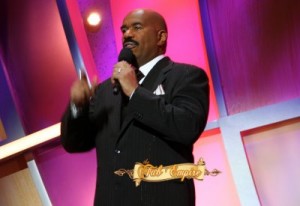By Shawn Brown
Black atheist! Do these words mean anything? Certainly not if such a person does not exist.
Everyone knows that black people love Jesus. With tears in our eyes and a bittersweet joy in our hearts, we marvel at the wonder of the divine. With hands raised high we sway to our own celestial rhythm. With a look of transcendent torment upon our faces, we sing His praises. Don’t we love Jesus? Don’t we all love Jesus?
I’ve heard it said that black people have a “Jesus fixation”, a single minded focus on God. From our earliest days we are taught that there is a mysterious and powerful man in the heavens above- enthroned some place between time and space. Omnipotent, omnipresent and omniscient- He is God-the-Father. The ethereal embodiment, if you will allow, of benevolence and love. We are taught by parents, grandparents and the preacher that “God is good!”
But, as the lesson of God’s goodness is taught with one breath, we are taught that God is awful with the next. He knows our thoughts, He knows our feelings, He knows what we will do next, and He knows our secrets and the hour of our deaths. This God is not to be trifled with. What fool would question Him- even in the quiet of one’s own mind?
Respecting the God that black Christians serve means not speaking doubt or even thinking it. How could there ever be such a thing as a black Atheist?
You serve the Lord with fear and trembling. You serve Him in perfect submission. You must love Him always. You must never think ill of Him. He is without fault. He is responsible for everything good in your life- not you. You are responsible for everything bad in your life- not Him. Praise the Lord when things go right; beg His forgiveness when they go wrong.
Now, how did we end up with this particular religious system? Well, that’s simple: Slavery. One of the original justifications for slavery was to bring the “heathen” African into contact with Christianity. The earliest enslaved Africans were converted by force before even leaving the slave castles of western Africa. They were now Christian by virtue of the slave trader’s power.
As time passed, many slaveholders ceased to rely on this pre-textual justification for slavery. After all, if you do not free the enslaved once they have become Christians, then providing them salvation seems a flimsy rationale. Continuing to parrot the old justification of Christianizing the African would be too absurd even for a slaveholder. However, Christianity was still useful to them. Logically, the slaveholder continued to teach Christianity in a way beneficial to their more genuine economic motives. From Ephesians they likely taught “slaves obey your masters here on Earth…” From Matthew 5:5 “Blessed are the meek, for they will inherit the Earth.” From Matthew 18:4 “[w]hoever humbles himself like this child is the greatest in the kingdom of heaven.” The slaveholders’ true intention was not to save souls, but to create a docile workforce. Unfortunately, this strategic impartation of Christianity began to take root.
As time passed, African-Americans began to replicate these religious norms independently. With each passing year our addiction to religion grew more complete, until finally Christianity became synonymous with blackness. The imposing nexus of historical indoctrination and present day hardship conspire to keep African-Americans chained to religion. Christian faith and hardship stand in equipoise within the black community- and understandably so. When people are oppressed there is a hunger for hope that can never fully be satisfied so long as the unjust conditions persist. The desire for justice is transferred to hope for happiness in a time yet to come.
This is why we love the Lord. This is why there are no black atheists. This is why we all love Jesus.
But, what happens if you do not? What happens if you began to doubt Jesus when you stopped believing in Santa Clause? What if you realized early on that there are two creation stories in Genesis, and that they are not the same? What if you realized that no god could be simple minded enough to use either method to create the universe? What if you believe that culture and isolation explain linguistic differences, and not the Tower of Babel? What if you believe it wrong to stone children- even when they disobey? What if you believe that eating an apple, which God intentionally put within Eve’s grasp, is not a just reason to thrust the world into suffering? What if you do not believe that a person could survive three days in the belly of a whale? What if you think it silly for an all knowing god to create his own nemesis? What if you think it odd for God to send Himself, to save us- from Himself? Would not it have been easier to simply forgive our sins without the blood soaked spectacle of Calvary? What if you find it inconceivable for an all-loving god to create an unimaginable hell for His own children? What if…
What if we stopped waiting on Jesus and started planning? What if we realized that deferring justice until the next life meant deferring it forever? What if we understood that following a religion which too often perpetuates patriarchy has a chilling effect on the development of millions of our potential leaders? What if we knew that our gay brothers and sisters had just as much right to exist as the rest of us (something that would be obvious to a historically oppressed people but for religious influence)? What if we could drop the inaction of religion, for the urgency that comes with knowing that it is up to us? What if we could drop the divisiveness of faith for the loving kindness of humanism? What if…
Of course this could never happen, not if you are black. No! You see, being a good Christian is never to question aloud. Being a good Christian is never to allow a question to linger in your mind. Being a good Christian means to turn off your rational mind when it becomes bothersome to your faith. Unfortunately, black people are good Christians.
If you are the type of person who believes that love began with Jesus, that morality was created by God, that mercy and justice are religious concepts, then you find my words striking. However, if you have dared to think beyond what you were told, if you prefer enlightenment to conditioning, then you may just see it differently. You will have realized that love, courage, empathy and kindness are all human inventions-not the altruistic inventions of a cosmic overlord. You will have realized that we are not abject by birth, but just as valuable as our ancestors have made us.
If you believe these things as I do, then you know that the justice we have long been denied is within our grasp. We can believe in our own virtue, instead of dismissing any notion of our own human goodness. We can accept the challenges of the present and master them completely. If we are courageous enough to examine our beliefs, we can break the chains placed on our minds so long ago. In so doing, we can, for once, live in a world of our choosing – but only if there exists such a thing as a black atheist.
Shawn Brown is an attorney who has studied law both in the United States and England. He has been a freethinker for several years and currently resides in the southwestern United States.












